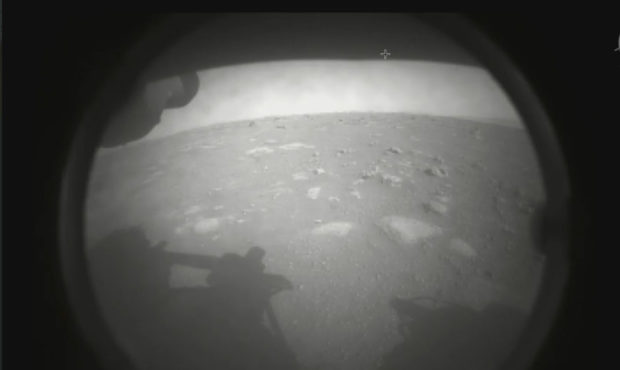NASA rover lands on Mars to look for signs of ancient life
Feb 19, 2021, 5:23 AM

This photo made available by NASA shows the first image sent by the Perseverance rover showing the surface of Mars, just after landing in the Jezero crater, on Thursday, Feb. 18, 2021. (NASA via AP)
(NASA via AP)
CAPE CANAVERAL, Fla. (AP) — A NASA rover streaked through the orange Martian sky and landed on the planet Thursday, accomplishing the riskiest step yet in an epic quest to bring back rocks that could answer whether life ever existed on Mars.
Ground controllers at the space agency’s Jet Propulsion Laboratory in Pasadena, California, leaped to their feet, thrust their arms in the air and cheered in both triumph and relief on receiving confirmation that the six-wheeled Perseverance had touched down on the red planet, long a deathtrap for incoming spacecraft.
“Now the amazing science starts,” a jubilant Thomas Zurbuchen, NASA’s science mission chief, said at a news conference, where he theatrically ripped up the contingency plan in the event of a failure and threw the document over his shoulders.
The landing marks the third visit to Mars in just over a week. Two spacecraft from the United Arab Emirates and China swung into orbit around Mars on successive days last week. All three missions lifted off in July to take advantage of the close alignment of Earth and Mars, journeying some 300 million miles in nearly seven months.
Perseverance, the biggest, most advanced rover ever sent by NASA, became the ninth spacecraft since the 1970s to successfully land on Mars, every one of them from the U.S.
The car-size, plutonium-powered vehicle arrived at Jezero Crater, hitting NASA’s smallest and trickiest target yet: a 5-by-4-mile strip on an ancient river delta full of pits, cliffs and rocks. Scientists believe that if life ever flourished on Mars, it would have happened 3 billion to 4 billion years ago, when water still flowed on the planet.
Over the next two years, Percy, as it is nicknamed, will use its 7-foot (2-meter) arm to drill down and collect rock samples containing possible signs of bygone microscopic life. Three to four dozen chalk-size samples will be sealed in tubes and set aside to be retrieved eventually by another rover and brought homeward by another rocket ship.
The goal is to get them back to Earth as early as 2031.
Scientists hope to answer one of the central questions of theology, philosophy and space exploration.
“Are we alone in this sort of vast cosmic desert, just flying through space, or is life much more common? Does it just emerge whenever and wherever the conditions are ripe?” said deputy project scientist Ken Williford. “We’re really on the verge of being able to potentially answer these enormous questions.”
China’s spacecraft includes a smaller rover that will also seek evidence of life, if it makes it safely down from orbit in May or June. Two older NASA landers are still humming along on Mars: 2012′s Curiosity rover and 2018′s InSight.
Perseverance was on its own during its descent, a maneuver often described by NASA as “seven minutes of terror.”
Flight controllers waited helplessly as the preprogrammed spacecraft hit the thin Martian atmosphere at 12,100 mph (19,500 kph), or 16 times the speed of sound, slowing as it plummeted. It released its 70-foot (21-meter) parachute and then used a rocket-steered platform known as a sky crane to lower the rover the final 60 or so feet (18 meters) to the surface.
It took a nail-biting 11 1/2 minutes for the signal confirming the landing to reach Earth, setting off back-slapping and fist-bumping among flight controllers wearing masks against the coronavirus.
Perseverance promptly sent back two grainy, black-and-white photos of Mars’ pockmarked, pimply-looking surface, the rover’s shadow visible in the frame of one picture.
“Take that, Jezero!” a controller called out.
NASA said that the descent was flawless and that the rover came down in a “parking lot” — a relatively flat spot amid hazardous rocks. Hours after the landing, Matt Wallace, NASA deputy project manager, reported that the spacecraft was in great shape.
Mars has proved a treacherous place for the world’s spacefaring nations, the U.S. included. In the span of less than three months in 1999, a U.S. spacecraft was destroyed upon entering orbit because engineers had mixed up metric and English units, and an American lander crashed on the surface after its engines cut out prematurely.
President Joe Biden tweeted congratulations over the landing, saying: “Today proved once again that with the power of science and American ingenuity, nothing is beyond the realm of possibility.”
NASA is teaming up with the European Space Agency to bring the rocks home. Perseverance’s mission alone costs nearly $3 billion.
The only way to confirm — or rule out — signs of past life is to analyze the samples in the world’s best labs. Instruments small enough to be sent to Mars wouldn’t have the necessary precision.
“It’s really the most extraordinary, mind-boggingly complicated and will-be history-making exploration campaign,” said David Parker, the European agency’s director of human and robotic exploration.
Former astronaut and one-time NASA science chief John Grunsfeld tweeted that Perseverance’s landing was “exactly the good news and inspiration we need right now.”
“Reminds us all that we will persevere COVID and political turmoil and that the best is yet to come,” he said.
___
The Associated Press Health and Science Department receives support from the Howard Hughes Medical Institute’s Department of Science Education. The AP is solely responsible for all content.













